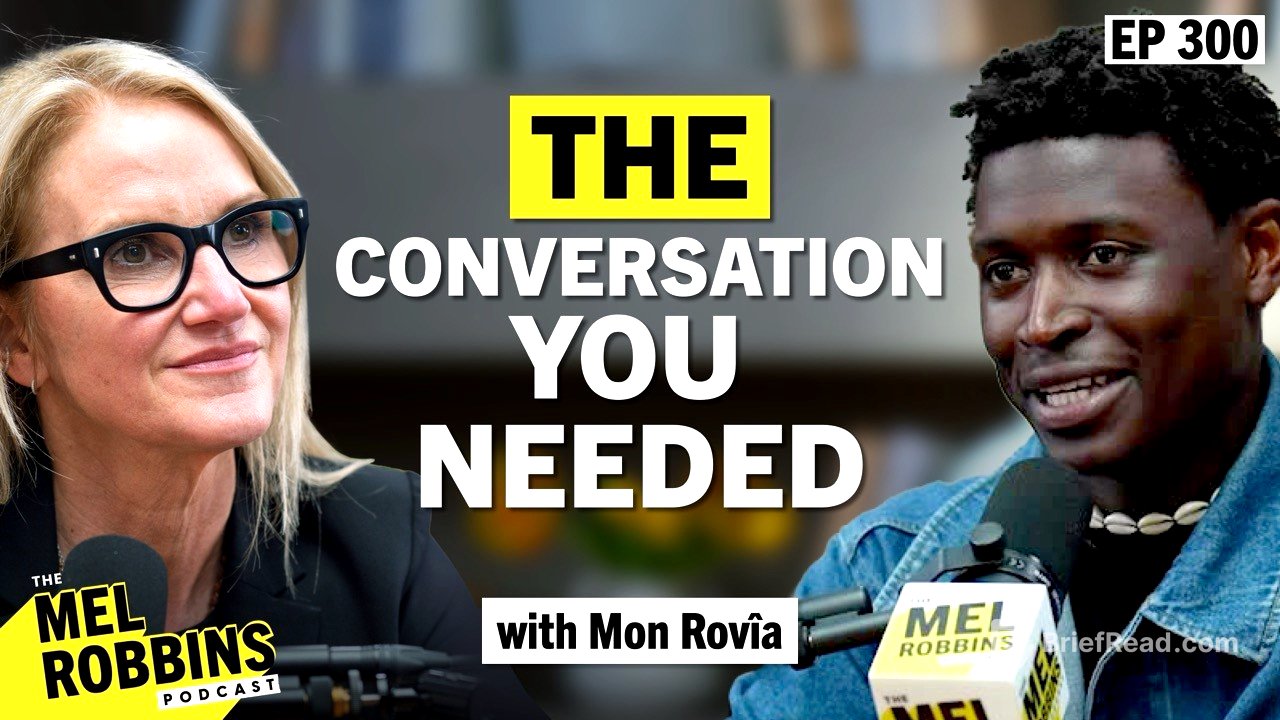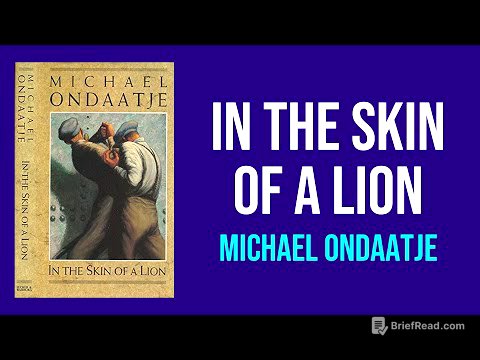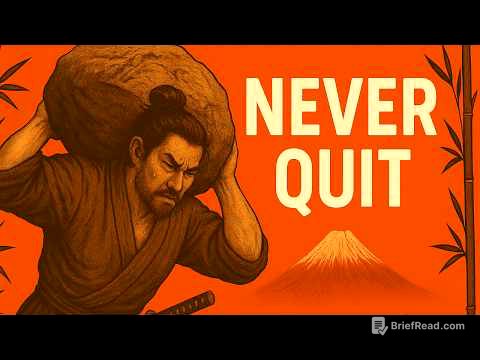TLDR;
Mel Robbins interviews Monrovia, a musician with a remarkable life story marked by war, adoption, and a journey towards healing and peace. Monrovia shares his experiences of growing up in Liberia during a civil war, being adopted, and finding solace and purpose through music. He emphasises the importance of acknowledging suffering, embracing one's identity, and continuing to move forward despite challenges. Key takeaways include:
- Life is full of suffering, but you still belong.
- Memory is important for continuation.
- Find a safe space to accept the truth.
- Shift from blame to claiming opportunities.
- Your life is a gift, so live in that freedom.
Introduction [0:00]
Mel introduces Monrovia, a musician whose life story is both extraordinary and inspiring. She highlights Monrovia's humility, compassion, and the powerful message of love, empowerment, and clarity that he brings. Mel expresses her excitement for the conversation and admires Monrovia's ability to transform past experiences into something beautiful through his music.
Monrovia's Message to the Listener [4:58]
Monrovia addresses the listener, emphasising that life is full of suffering, but this doesn't diminish their belonging or purpose. He hopes his stories and music will remind people that their time here is meant to be. He encourages those suffering to remember past challenges they've overcome, fostering the belief that they will continue to persevere and find fulfillment.
Describing Monrovia's Music [7:10]
Monrovia describes his music as peaceful, aiming to alleviate anxiety and encourage listeners to reflect on their own importance. He hopes his music transports people to a realm where they can understand their value. Initially a shy person, Monrovia didn't always aspire to be a musician, but his life experiences and the need to assimilate in America led him to be watchful and observant.
Healing with Others and Finding Peace [9:46]
Monrovia discusses the importance of "healing with others" and cultivating inner peace, born from his own experience of suffering alone. Music became his outlet for honest expression, and he realised its potential to connect with others. His mission is to create a community where people can share and heal together.
The Resonating Message of Peace and Healing [11:49]
Monrovia reflects on why his music and story resonate with millions worldwide, attributing it to a need for quiet, intimate reflection in a fast-paced world. He uses the ukulele and storytelling to bring listeners back to moments in their own lives, encouraging them to confront themselves honestly. He acknowledges the difficulty of consistently pouring out love and grace, highlighting the importance of community for replenishment.
Afro-Appalachian Roots [14:23]
Monrovia explains his music's Afro-Appalachian identity, blending his West African heritage (Liberia) with the history and culture of Appalachia in Tennessee. He describes the mixing of traditions among slaves, Irish, and Scots in the mountains, and how this history was revealed to him as he created his music.
Early Life in Liberia [15:34]
Monrovia recounts his early life in Liberia amidst civil war. After his mother passed away in childbirth, he was taken in by a missionary family. He reflects on the impact of being uprooted from his homeland, language, and culture, noting that he remained quiet for a long time. He shares that he recently reconnected with his sister after many years.
Shame and Moving Forward [20:15]
Monrovia discusses the sense of shame he felt about his past and where he came from, even though he wasn't responsible for the events. He advises listeners who feel similarly to recognise that there is much more beyond the past and not to let it hold them back. He emphasises the importance of continuing to move forward, as good things may be just around the corner.
The Art of Continuing [22:20]
Monrovia defines "continuing" as finding another day, recalling times he wanted to quit due to survivor's guilt and feelings about his mother. He would tell himself to find another day to quit, helping him make it through each day and eventually make better choices.
Adoption and Complicated Feelings [25:12]
Monrovia discusses the complexities of adoption, noting that adopted individuals often carry a range of emotions, including gratitude, confusion, and questions about belonging. He stresses the importance of adoptive parents acknowledging and creating space for these feelings, helping adopted children understand their history and identity. He shares about his song "Whose Face Am I?" which explores these themes.
Discovering Truth and Healing [29:00]
Monrovia shares that learning about his mother helped him heal. He discovered she loved him very much and sacrificed to care for him during the war. He also reveals that he was conceived due to sexual violence during the war, a truth he had long been afraid to confront. Accepting this truth and recognising the love that followed brought him peace.
Finding a Safe Space [33:39]
Monrovia advises listeners to find a safe space to accept the truth and come to terms with their life stories. For him, music was that safe space. He emphasises that this process takes time and requires creating quiet spaces to sit still and reflect. He shares that while he felt physically safe after leaving Liberia, he still searches for emotional safety.
The Power of Journaling [36:31]
Monrovia discusses the power of journaling as an early entry point for processing his experiences and writing music. Journaling provided a safe space where he could be himself and express what he had a hard time saying. He still uses journaling to write lyrics, drawing from thoughts and feelings that resurface over time.
From Suffering to Opportunity [39:36]
Monrovia shares that he used to be in love with his suffering, believing he deserved it. He felt guilty for not utilising the opportunity he had in America and for not respecting the lives lost in Liberia. He turned this around after hitting a low point and accepting help from his father, who invited him to California.
Building a House and Rebuilding Himself [43:35]
While in California, Monrovia helped his father build a house, finding healing in the process. He saw a correlation between the destruction and rebuilding of the house and his own inner work. He advises listeners to notice the hands extended towards them, as they can help them out of difficult places.
Changing His Name to Monrovia [44:57]
Monrovia explains why he changed his name from John J. to Monrovia, the capital of Liberia. He did this after going to California, to remember his people and where he's from, to keep him grounded.
Processing Survivor Guilt [46:16]
Monrovia discusses how he processed survivor guilt, shifting from blame to claiming the opportunity he was given. He now sees his rescue as a gift, allowing him to bring more good into the world. He no longer views his work as a penance but as a way to shine light on his people and others who are struggling.
From Guilt to Growth [49:27]
Monrovia advises those struggling with guilt to change it to growth, noticing opportunities for growth in every situation. He emphasises that it's not about massive overnight changes but small, incremental improvements.
Finding His Voice Through the Ukulele [50:30]
Monrovia recounts his journey to singing and playing the ukulele. He played guitar in high school and won a people's choice award in college, but he didn't think it was for him. After moving to California, he picked up a ukulele and started writing songs. He initially hesitated to enter the singer-songwriter genre due to his race but found success on TikTok by playing original songs on the ukulele.
Resisting the Call [54:48]
Monrovia reflects on resisting the call to pursue music professionally, attributing it to self-doubt and the belief that he didn't deserve it. He emphasises the importance of trusting those who encourage you and staying focused on what you enjoy doing.
Making the Move and Giving Your Gift [56:41]
Monrovia encourages listeners to stop fighting against what they deeply know to be true and to make the move, emphasising that they deserve to be happy. He notes that denying oneself is a form of suffering and that gifts are meant to be given.
Embracing Fear and Refining Your Gift [59:21]
Monrovia acknowledges that fear is okay but shouldn't stop you from finding what's more. He advises listeners to keep pouring, trying, and learning from their gift, refining it as they go. He shares that his journey involved putting himself out there and working at his craft, eventually revealing where it should be.
Who Am I? [1:00:17]
Monrovia answers the question "Who am I?" by stating, "I am John J Monrovia, son of Maria from Liberia, West Africa." He encourages listeners who don't know who they are to believe that they are meant to be here, and the world will open up, leading them to a place of belonging.
The Importance of Belief [1:01:11]
Monrovia stresses that the most important aspect is believing you are meant to be here. He hopes people will remind each other of this daily, as it's easy to forget due to life's hardships. He encourages listeners to take away that their life is a gift and to live in that freedom, pouring all the love they can into their experience.
Crooked the Road [1:03:31]
Monrovia discusses his song "Crooked the Road," which is about leaving suffering behind and accepting help. He shares that the song was inspired by his time on Lookout Mountain and the importance of noticing those who want to help. He explains that the song is about accepting help and that the person standing by the telephone line are the helpers.
Performance of Crooked the Road [1:07:06]
Monrovia performs "Crooked the Road" live, sharing that the song means a lot to him and takes him right back to the emotions he felt when he wrote it.
Conclusion [1:11:20]
Mel expresses her pride in Monrovia and congratulates him on his success. She thanks him for accepting the gift of his life and sharing it with others. She also thanks the listeners for taking the time to listen and encourages them to take to heart everything Monrovia shared, believing in their ability to create a better life.









